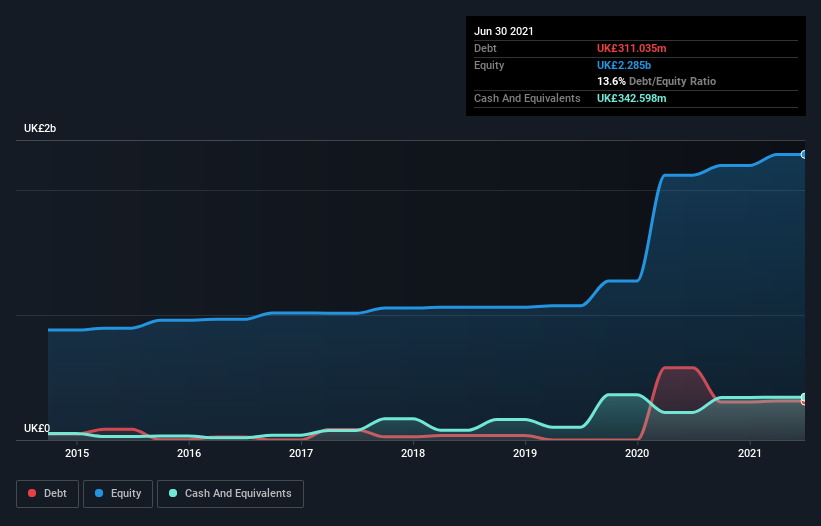Vistry Group (LON:VTY) Could Easily Take On More Debt
Warren Buffett famously said, 'Volatility is far from synonymous with risk.' It's only natural to consider a company's balance sheet when you examine how risky it is, since debt is often involved when a business collapses. We note that Vistry Group PLC (LON:VTY) does have debt on its balance sheet. But the more important question is: how much risk is that debt creating?
When Is Debt Dangerous?
Debt is a tool to help businesses grow, but if a business is incapable of paying off its lenders, then it exists at their mercy. In the worst case scenario, a company can go bankrupt if it cannot pay its creditors. However, a more frequent (but still costly) occurrence is where a company must issue shares at bargain-basement prices, permanently diluting shareholders, just to shore up its balance sheet. Of course, plenty of companies use debt to fund growth, without any negative consequences. When we think about a company's use of debt, we first look at cash and debt together.
View our latest analysis for Vistry Group
What Is Vistry Group's Net Debt?
As you can see below, Vistry Group had UK£311.0m of debt at June 2021, down from UK£578.0m a year prior. But it also has UK£342.6m in cash to offset that, meaning it has UK£31.6m net cash.
How Healthy Is Vistry Group's Balance Sheet?
According to the last reported balance sheet, Vistry Group had liabilities of UK£934.5m due within 12 months, and liabilities of UK£556.1m due beyond 12 months. On the other hand, it had cash of UK£342.6m and UK£245.2m worth of receivables due within a year. So its liabilities total UK£902.8m more than the combination of its cash and short-term receivables.
This deficit isn't so bad because Vistry Group is worth UK£2.77b, and thus could probably raise enough capital to shore up its balance sheet, if the need arose. But we definitely want to keep our eyes open to indications that its debt is bringing too much risk. While it does have liabilities worth noting, Vistry Group also has more cash than debt, so we're pretty confident it can manage its debt safely.
Better yet, Vistry Group grew its EBIT by 127% last year, which is an impressive improvement. That boost will make it even easier to pay down debt going forward. There's no doubt that we learn most about debt from the balance sheet. But it is future earnings, more than anything, that will determine Vistry Group's ability to maintain a healthy balance sheet going forward. So if you're focused on the future you can check out this free report showing analyst profit forecasts.
Finally, a business needs free cash flow to pay off debt; accounting profits just don't cut it. While Vistry Group has net cash on its balance sheet, it's still worth taking a look at its ability to convert earnings before interest and tax (EBIT) to free cash flow, to help us understand how quickly it is building (or eroding) that cash balance. Over the last three years, Vistry Group actually produced more free cash flow than EBIT. There's nothing better than incoming cash when it comes to staying in your lenders' good graces.
Summing up
While Vistry Group does have more liabilities than liquid assets, it also has net cash of UK£31.6m. The cherry on top was that in converted 115% of that EBIT to free cash flow, bringing in UK£326m. So we don't think Vistry Group's use of debt is risky. The balance sheet is clearly the area to focus on when you are analysing debt. But ultimately, every company can contain risks that exist outside of the balance sheet. Case in point: We've spotted 1 warning sign for Vistry Group you should be aware of.
At the end of the day, it's often better to focus on companies that are free from net debt. You can access our special list of such companies (all with a track record of profit growth). It's free.
This article by Simply Wall St is general in nature. We provide commentary based on historical data and analyst forecasts only using an unbiased methodology and our articles are not intended to be financial advice. It does not constitute a recommendation to buy or sell any stock, and does not take account of your objectives, or your financial situation. We aim to bring you long-term focused analysis driven by fundamental data. Note that our analysis may not factor in the latest price-sensitive company announcements or qualitative material. Simply Wall St has no position in any stocks mentioned.
Have feedback on this article? Concerned about the content? Get in touch with us directly. Alternatively, email editorial-team (at) simplywallst.com.

